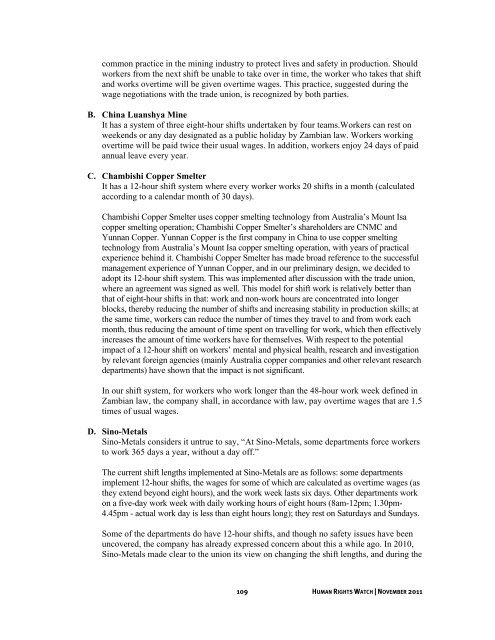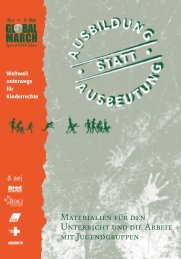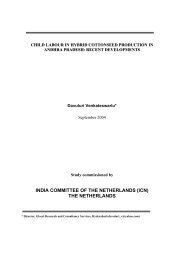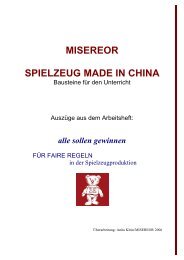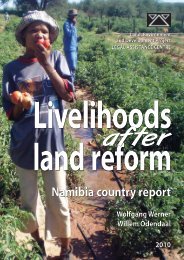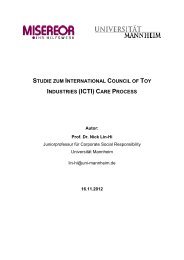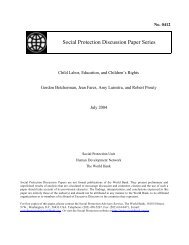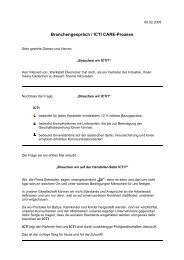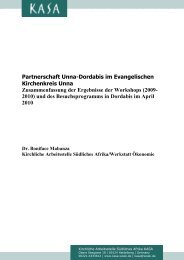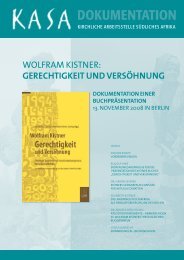“You'll Be Fired if You Refuse†- Human Rights Watch
“You'll Be Fired if You Refuse†- Human Rights Watch
“You'll Be Fired if You Refuse†- Human Rights Watch
You also want an ePaper? Increase the reach of your titles
YUMPU automatically turns print PDFs into web optimized ePapers that Google loves.
common practice in the mining industry to protect lives and safety in production. Should<br />
workers from the next sh<strong>if</strong>t be unable to take over in time, the worker who takes that sh<strong>if</strong>t<br />
and works overtime will be given overtime wages. This practice, suggested during the<br />
wage negotiations with the trade union, is recognized by both parties.<br />
B. China Luanshya Mine<br />
It has a system of three eight-hour sh<strong>if</strong>ts undertaken by four teams.Workers can rest on<br />
weekends or any day designated as a public holiday by Zambian law. Workers working<br />
overtime will be paid twice their usual wages. In addition, workers enjoy 24 days of paid<br />
annual leave every year.<br />
C. Chambishi Copper Smelter<br />
It has a 12-hour sh<strong>if</strong>t system where every worker works 20 sh<strong>if</strong>ts in a month (calculated<br />
according to a calendar month of 30 days).<br />
Chambishi Copper Smelter uses copper smelting technology from Australia’s Mount Isa<br />
copper smelting operation; Chambishi Copper Smelter’s shareholders are CNMC and<br />
Yunnan Copper. Yunnan Copper is the first company in China to use copper smelting<br />
technology from Australia’s Mount Isa copper smelting operation, with years of practical<br />
experience behind it. Chambishi Copper Smelter has made broad reference to the successful<br />
management experience of Yunnan Copper, and in our preliminary design, we decided to<br />
adopt its 12-hour sh<strong>if</strong>t system. This was implemented after discussion with the trade union,<br />
where an agreement was signed as well. This model for sh<strong>if</strong>t work is relatively better than<br />
that of eight-hour sh<strong>if</strong>ts in that: work and non-work hours are concentrated into longer<br />
blocks, thereby reducing the number of sh<strong>if</strong>ts and increasing stability in production skills; at<br />
the same time, workers can reduce the number of times they travel to and from work each<br />
month, thus reducing the amount of time spent on travelling for work, which then effectively<br />
increases the amount of time workers have for themselves. With respect to the potential<br />
impact of a 12-hour sh<strong>if</strong>t on workers’ mental and physical health, research and investigation<br />
by relevant foreign agencies (mainly Australia copper companies and other relevant research<br />
departments) have shown that the impact is not sign<strong>if</strong>icant.<br />
In our sh<strong>if</strong>t system, for workers who work longer than the 48-hour work week defined in<br />
Zambian law, the company shall, in accordance with law, pay overtime wages that are 1.5<br />
times of usual wages.<br />
D. Sino-Metals<br />
Sino-Metals considers it untrue to say, “At Sino-Metals, some departments force workers<br />
to work 365 days a year, without a day off.”<br />
The current sh<strong>if</strong>t lengths implemented at Sino-Metals are as follows: some departments<br />
implement 12-hour sh<strong>if</strong>ts, the wages for some of which are calculated as overtime wages (as<br />
they extend beyond eight hours), and the work week lasts six days. Other departments work<br />
on a five-day work week with daily working hours of eight hours (8am-12pm; 1.30pm-<br />
4.45pm - actual work day is less than eight hours long); they rest on Saturdays and Sundays.<br />
Some of the departments do have 12-hour sh<strong>if</strong>ts, and though no safety issues have been<br />
uncovered, the company has already expressed concern about this a while ago. In 2010,<br />
Sino-Metals made clear to the union its view on changing the sh<strong>if</strong>t lengths, and during the<br />
109 HUMAN RIGHTS WATCH | NOVEMBER 2011


